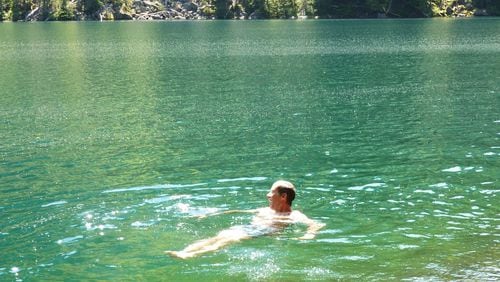You swim to stay healthy, but taking a lap in some lakes and parts of the ocean can make you sick. Paddle around in the wrong kind of water and you could get sick or even die from a recreational water illness (RWI). Here's what you should know:
RELATED: Doctors answers 6 questions about flesh-eating bacteria
What are recreational water illnesses?
Recreational water illnesses are illnesses that spread when swimmers come in contact with contaminated bodies of water.
According to the CDC's healthy swimming website, most RWIs are caused by germs contracted by swallowing, breathing, or touching bacteria-ridden water in swimming pools, rivers, lakes or oceans.
What types of bacteria can cause RWIs?
One is brain-eating amoeba. According to Jennifer Cope, medical officer in the CDC's waterborne disease prevention branch, the brain-eating amoeba is rare but almost always fatal.
"Naegleria fowleri is commonly referred to as the brain-eating amoeba and causes a rare but usually fatal disease when the amoeba goes up the nose," she said. "This amoeba is found in warm freshwater like lakes and rivers. If you or your kids are swimming in warm freshwater this summer, take precautions to avoid getting water up your nose."
Vibrio is another. They are found naturally in the ocean, said Karen Wong, medical officer in CDC's enteric disease epidemiology branch.
"It's important to keep seawater and brackish water out of any open wounds, cuts, or scrapes to help prevent vibrio infection. Anyone can get vibriosis, but people with liver disease or weakened immune systems are at the highest risk for severe illness and complications."
Other lake- and ocean-borne bacteria include Crypto (short for Cryptosporidium), Giardia, Shigella, norovirus and E. coli.
What types of infections can you get?
A wide variety of infections that also fall into the RWI category include gastrointestinal, skin, ear, respiratory, eye, neurological and wound infections. Swimmers who get RWIs can show a variety of symptoms, but the most likely is diarrhea.
How can I avoid it?
One good way to avoid contracting an RWI from the ocean is to check beaches against the Environmental Protection Agency's online beach advisory. It tells whether bacterial levels at U.S. coastal and Great Lakes beaches are monitored and whether a beach is open for swimming.
If the lake or ocean beach you're visiting is not monitored regularly, follow these tips from Michele Hlavsa, chief of the healthy swimming program at the CDC:
• Avoid swimming after a heavy rain.
• Look for storm drains (pipes that drain polluted water from streets) along the beach. Don't swim near them.
• Look for trash and other signs of pollution such as oil slicks in the water. These kinds of pollutants may indicate the presence of disease-causing microorganisms that may also have been washed into the water.
About the Author






